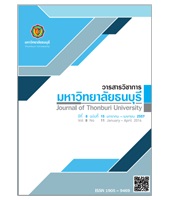สารสนเทศ : การเรียนรู้เพื่อใช้ประโยชน์
Keywords:
การรู้สารสนเทศ, สารสนเทศ, Information Literacy, InformationAbstract
สารสนเทศ : การเรียนรู้เพื่อใช้ประโยชน์ เป็นพื้นฐานสำคัญในการตระหนักรู้ถึงคุณค่าและการเข้าถึงสารสนเทศของทุกคน สำหรับผู้ที่เรียนอยู่ในสถาบันการศึกษาทุกระดับ โดยเฉพาะนักศึกษาต้องมีความเข้าใจถึงการเรียนรู้เพื่อนำมาใช้ประโยชน์ทางวิชาการจากสารสนเทศที่มีการบันทึกไว้ในรูปแบบของสื่อ 3 ประเภท ได้แก่ 1) สื่อสิ่งพิมพ์ 2) สื่อโสตทัศน์ และ 3) สื่ออิเล็กทรอนิกส์ เนื่องจากสารสนเทศเป็นทรัพย์สินทางปัญญา เป็นลิขสิทธิ์ของผู้สร้างผลงานนั้นๆ ขึ้นมา จึงมีกฎหมายคุ้มครองสารสนเทศ มีทั้งที่เป็นคุณประโยชน์และโทษ การนำมาใช้จำเป็นต้องมีการคัดเลือกอย่างพินิจพิเคราะห์ให้ลึกซึ้งทุกแง่ทุกมุมว่าควรแก่การเชื่อถือมากน้อยเพียงใด หลักการว่าสิ่งใดควรเชื่อ สิ่งใดไม่ควรเชื่อ และไม่ให้เชื่ออย่างงมงาย ต้องใช้ปัญญาพิจารณาให้เห็นจริงถึงคุณโทษ หรือดีไม่ดี ก่อนเชื่อ ต้องใช้หลักกาลามสูตร ดังคำสอนของสมเด็จพระสัมมาสัมพุทธเจ้า ทรงแสดงไว้แก่ชาวกาลามะ
การนำสารสนเทศ ของผู้อื่นมาใช้ประโยชน์ในผลงานทางวิชาการ การดำเนินชีวิต และประกอบกิจการงานให้ได้ทั้งประสิทธิผลและประสิทธิภาพ ตามความต้องการหรือวัตถุประสงค์ของตนจำเป็นต้องมีความรับผิดชอบ ตระหนักและระมัด ระวังอย่างเป็นผู้มีจริยธรรม มีความรับผิดชอบตามหลักจรรยาบรรณวิชาชีพ โดยไม่ให้มีการละเมิดลิขสิทธิ์ หรือลอกเลียนโดยไม่ระบุแหล่งอ้างอิง ต้องให้เกียรติแก่ผู้สร้างผลงานนั้นๆ ด้วยการอ้างอิงตามหลักการนำเสนอผลงานทางวิชาการที่เป็นสากล จึงจะเป็นที่ยอมรับโดยทั่วไป
INFORMATION : TO STUDY ITS PRORER USAGE
In this digital age we are all impacted by the immense amount of information on our daily life. It is incumbent upon us to properly access relevant information and make full use of such information for the benefits of all concerned. For students at all educational levels, understanding the role of information and its usage is crucial so as to become well-rounded and informed citizens. Information can be classified according to the media: print, videos, and electronics. Certain information is invariably created by someone; as such, information is protected by the Intellectual Property laws. Those who want to gain access must carefully realize the extent of those rights. Another point of concern is the reliability of information. In this respect, it is recommended that one follows a set of guidelines, commonly known as the Kalama Sutta tenet which provides a checklist for accepting something as true or credible. In addition, logic must trump personal bias and attitude. As with a coin that has two sides, one must systematically scrutinize the pros and cons of the information at hand before making a judicious decision. Finally, when information is used in academic or other professional circles, one must be responsible, ethical and respectful by fully acknowledging the source and its author(s) according to standard practices including avoidance of plagiarism.







